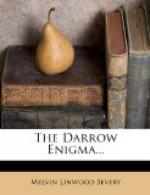Every eye was fixed upon him, and every ear strained to its utmost as he turned slowly toward the Judge and said with a calm dignity which surprised us all:
A. Your Honour is in error. I said that I made use of a specially constructed hypodermic syringe. I have not said that I struck Mr. Darrow with it. There is, therefore, nothing contradictory in my statements.
Again the prisoner had scored, and again the audience exchanged approving glances which plainly said: “He’s clever enough for them all!”
Then the Court continued the examination.
Q. Were you upon the Darrow estate when Mr. Darrow met his death?
A. Yes, your Honour.
Q. Where?
A. Just outside the eastern parlour-window, your Honour.
Q. Did you strike the blow which caused Mr. Darrow’s death?
A. No, your Honour.
Q. What! Have you not said you are responsible for his murder?
A. Yes, your Honour.
Q. Ah, I see! You had some other person for an accomplice?
A. No, your Honour.
Q. Look here, sir! Do you propose to tell us anything of your own accord, or must we drag it out of you piecemeal?
A. No power can make me speak if I do not elect to, and I only elect to answer questions. Commission for contempt will hardly discipline a man in my position, and may lead me to hold my peace entirely.
The Court turned away with an expression of disgust and engaged Jenkins and Maitland in a whispered conversation. The prisoner had again scored. There is enough of the bully in many judges to cause the public to secretly rejoice when they are worsted. It was plain to be seen that the audience was pleased with Latour’s defiance.
Maitland now resumed the examination with his accustomed ease. One would have thought he was addressing a church sociable,—if he judged by his manner.
Q. You have testified to being responsible for the death of John Darrow. The instrument with which he was killed was directly or indirectly your handiwork, yet you did not strike the blow, and you have said you had no other person for an accomplice. Am I substantially correct in all this?
A. You are quite correct.
Q. Very good. Did John Darrow’s death result from a poisoned wound made by the instrument you have described?
A. It did.
This reply seemed to nonplus us all with the exception of Maitland and Godin. These two seemed proof against all surprises. The rest of us looked helplessly each at his neighbour as if to say, “What next?” and we all felt,—at least I did and the others certainly looked it,—as if the solution of the enigma were farther away than ever.
Maitland proceeded in the same methodical strain.
Q. A blow was given, yet neither you nor any person acting as your accomplice gave it. Did Mr. Darrow himself give the blow?




